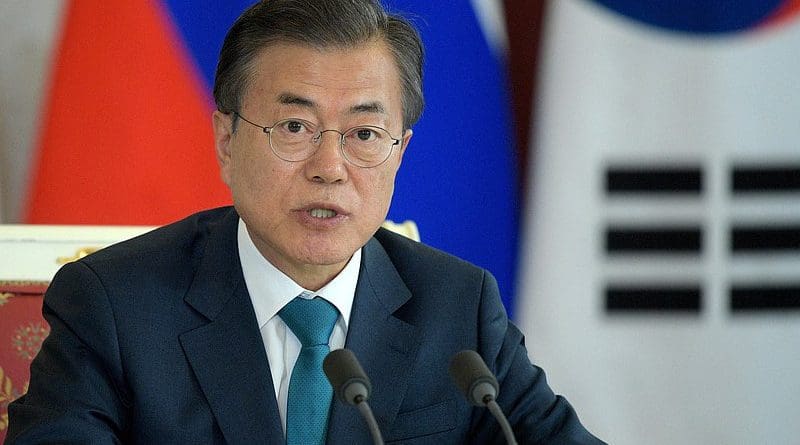Amplifying South Korea’s Response To The Myanmar Coup – Analysis
By Sea Young (Sarah) Kim*
In the aftermath of the February military coup in Myanmar, South Korean President Moon Jae-in issued a statement directly condemning the violent suppression of peaceful protesters. While other countries have voiced similar messages, South Korea has taken a noticeably proactive response to the events in Myanmar. These efforts can be further amplified through greater multilateral coordination with allies and partners.
South Korea’s government and civil society have both condemned military violence and urged Myanmar’s military junta to steer the country back towards democracy. In February, the National Assembly passed a parliamentary resolution calling for the immediate suspension of the use of violence against innocent people. Outside the government, religious communities — both Christian and Buddhist alike — have also expressed support for the people of Myanmar. It was the first time ever that the Jogye Order — the largest Buddhist sect in South Korea — released a public statement in support of a civil disobedience movement.
South Korea was also quick to impose costs on the ruling military and to safeguard Myanmar citizens residing in South Korea. Military exports to Myanmar were banned and development aid and investment projects are being closely reconsidered in response to the violence. South Korea also promised some 25,000 Myanmar nationals safe harbour by extending their visas. This decision contrasts with Malaysia’s deportation of more than 1000 Myanmar nationals in February, though Malaysian authorities paused further repatriations until an emergency ASEAN summit scheduled in the coming weeks.
The Moon administration’s response to the events in Myanmar may reflect something more profound than practical interest. Many in Myanmar find inspiration from South Korea’s own story of economic development and democratisation. The country’s democratically elected leaders demonstrated this in 2014 by establishing the Myanmar Development Institute, a government think tank modelled after and with cooperation from South Korea’s Korea Development Institute. President Moon also expressed his understanding of the Myanmar people’s desire for democratisation in light of South Korea’s own historical experience. The situation in Myanmar reminds many South Koreans of the violent 1980 Gwangju Democratization Movement.
Unlike the events in Gwangju, the movement in Myanmar is unfolding in real time for people everywhere with an internet connection. Tech-savvy protesters are evading state censors and reaching out through social media and other platforms, broadcasting in real time the atrocities carried out by the military and asking for help.
Despite the global visibility, efforts by the international community to play a larger role have been hampered. The UN has been stonewalled by Chinese and Russian resistance to intervention, with the two countries recently announcing a strategic partnership against interference and unilateral sanctions, including recent US and EU sanctions targeting the military leaders behind the Myanmar coup. ASEAN members including Vietnam, Cambodia and Thailand have also opted for a softer approach to leave room for engagement and dialogue with Myanmar’s military.
Amid this opposition and reluctance from other nations to act, the coup presents South Korea a geopolitical challenge and an opportunity to improve its own middle power aspirations and strengthen regional policy coordination with allies, including the United States. Moon’s New Southern Policy — revamped into the New Southern Policy Plus — seeks to elevate South Korea’s cooperation with South Asia and ASEAN. Ramping up in response to the situation in Myanmar provides Seoul with a critical opportunity to organise and coordinate tangible response measures. As international aid groups face difficulties in delivering humanitarian assistance, South Korea should throw its weight behind the establishment of an ASEAN task force dedicated to distributing necessary supplies to vulnerable groups.
Post-coup coordination comes at a critical time as the new Biden administration hopes to form a ‘coalition of democracies’ in Asia as part of its Indo-Pacific strategy. South Korea can help enforce existing sanctions on Myanmar. Seoul has extensive business and investment ties with Naypyidaw as its sixth-largest foreign investor, accounting for more than US$4 billion.
South Korea along with Japan were top donors to Myanmar prior to the coup during a period when the United States and other Western nations were hesitant to expand investment due to human rights abuses against Rohingya Muslims. South Korea and Japan could add to existing economic pressure from the US Treasury and the United Kingdom to coordinate sanctions on military-controlled conglomerates, particularly the Myanmar Economic Corporation and Myanmar Economic Holdings Limited.
South Korea can deliver a more substantive impact in Myanmar through a coordinated multilateral effort. Humanitarian aid and the imposition of significant costs on the ruling military are the two most productive means of achieving this.
*About the author: Sea Young (Sarah) Kim is a foreign policy analyst based in Seoul.
Source: This article was published by East Asia Forum

